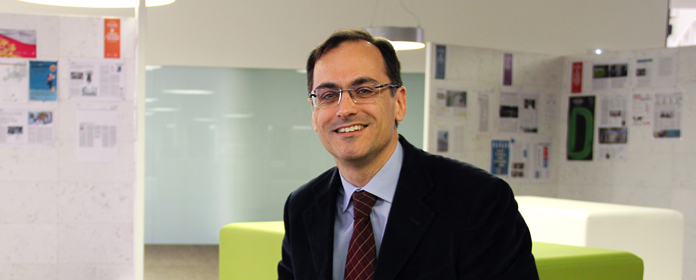"The context of development of adolescents influences character problems more than new technologies"
The director of InterMedia Consulting gave a seminar of the School of Education and Psychology and the ICS of the University.

PHOTO: Natalia Rouzaut
"The programs of study reveal that the context of development of adolescents has a greater influence on character problems than exhibition to new technologies". This is what Reynaldo Rivera, director general manager of InterMedia Consulting and professor at the Universidad Austral (Argentina), said at the University of Navarra.
According to him, interpersonal relationships are very important for training in values because they have a great impact on the way young people live. In his opinion, the influence of social networks depends on the quality of these relationships: "They can help as long as you are able to be on contact with positive networks".
The specialist made these statements in the framework of a seminar organized by the School of Education and Psychology and the Institute for Culture and Society (ICS) of the University of Navarra, at the framework of the project 'Investigating and promote the Education of character in secondary schools in Latin America', which receives funding from the Templeton World Charity Foundation.
Rivera makes reference letter to the research carried out by the organization he leads, which has been studying the Education character for nine years and compiling data from schools in Latin America. During this period, more than 28,000 adolescents have been interviewed. Thanks to the empirical data obtained through Big Data, it guides schools in making decisions on how to address the Education of character.
training in virtues vs. ideological trainingHis programs of study has shown that young people cultivate virtues such as empathy to a lesser extent. In his opinion, this is related to the example of adults with their constantly changing lifestyles, which hinder stability in personal relationships.
The specialist emphasizes that the family should be the first formator in Education of character. "The problem is when there is no family, when the family is dysfunctional, when it undergoes a very big cultural change or when the parents work ten hours a day in order to survive", he laments. In this sense, he stresses that the training of a child in virtues requires a broader network : "It cannot depend only on the family because the adolescent needs to be able to relate outside of it".
At this point, he calls for the involvement of the center educational, which in his opinion should bet on the Education of character "as something intrinsic to its identity, not as something annexed". To carry it out adequately, he calls for "a long-term plan deadline" and to orient the curricula according to each course. "In our research, we have not only seen differences between schools, but also between grades and classes," he points out.
The researcher underlines the importance of distinguishing between training in virtues and training in ideological content, warning that the former will always be positive while the latter seeks to manipulate.
"In many countries there are programs imposed by some governments to manipulate Education in order to impose an ideology," he says. Against this, he proposes developing critical capacity, "which allows us to establish dialogues with those who do not think the same way".
